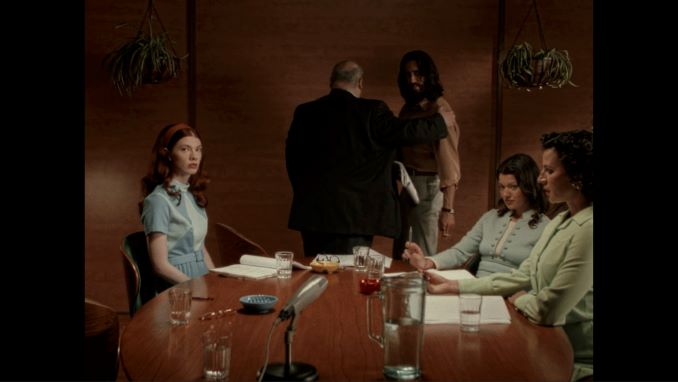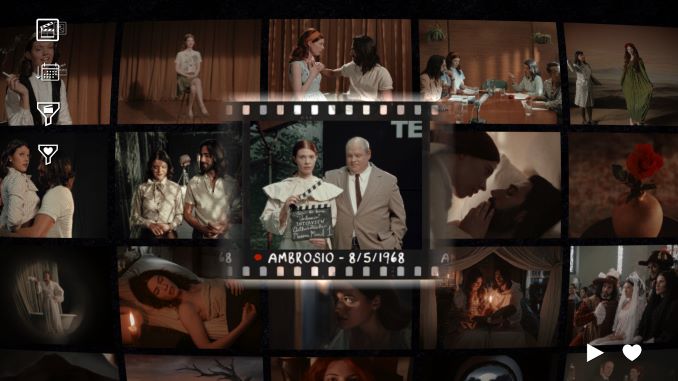While I got my start writing about games, I’ve spent my last few years growing as a film critic. So when I saw Immortality, the latest interactive film from Sam Barlow (the designer of Her Story and Telling Lies), I knew I needed to jump in. Immortality tasks players with restoring the career of the unknown, long missing, and entirely fictional actor Marissa Marcel. You search through her TV appearances, her trilogy of films (Ambrosio, Minsky, and Two of Everything), audition scenes, table reads, rehearsals, TV interviews, and even 8 mm movie diaries for clues, trying to piece together what happened to her and why.
A star whose trilogy of films were never released, Marcel disappeared in 1999, making each bit of film a capsule that can potentially unlock the mystery you find yourself spiraling down. Set up as an interactive film restoration project, Immortality’s mechanics see players collate the surviving footage of Marcel’s three unreleased movies, pushing them to dig deeper as they watch the scenes.
To be completely honest, I tend to keep away from nonlinear narratives. Jumping from one action to another can easily become a confusing mess with no breadcrumbs to follow back and to find a path forward. Immortality easily avoids this by allowing the player to retrace their steps, looking back on each piece of film they’ve seen previously. It can sometimes feel like you’re poking around at random when selecting items to zoom into and move to the next section of film, but as you retrace your steps and see the whole picture, everything comes into focus.
The strength of Immortality is the way that its developers have narratively branched whole frames of films. Whether you choose to zoom into a water glass, a script, a face, or any other element, we see a thread that connects us to the next moment. It makes sense visually and, in hindsight, narratively as well.

With its use of full-motion video, Immortality initially feels like watching bad indie movies until the moment when it doesn’t. I found myself clicking from one piece to another, at first trying to see if the narrative design would break if I clicked on the most random of items. Soon, though, I found myself gripped by how well the story flowed, along with the mechanic of rewinding tape as if I’m on a Moviolo or Steenbeck, scrubbing away at hours of footage looking for small fragments of something I wasn’t even sure of. Instead of clicking on random items, I started focusing on faces, scripts, and blood on clothing, trying to catch up with where the mystery of Marcel’s life would take me. While the game is completely subtitled, it isn’t necessarily the words that you pick up and focus on, but rather the visual language that each frame presents.
The acting in the films isn’t great, and part of that seems to be by design. Additionally, the game itself drops a content warning of sorts that situates the films you’re about to see as purely archival and products of their time. The immersive nature of the game prompts the player as almost an employee with a job to do, and as you scrub footage that helps you get sucked into Marcel’s world.
Before I knew it, I had chased multiple rabbits down multiple holes only to come out for air when I looked at how much time had passed. The way the controls are integrated into the game allows you to lose yourself, and the simple act of watching film consistently makes this an easy game to just stay in. That said, for the best experience, PC players need to play with a controller which allows you to embrace the full mechanics of the game. The function of turning the dial back or forward to look through film is just honestly not easily done with a mouse and can remove some of the immersion as you struggle to move throughout a clip.
If I had to explain Immortality to someone who had never heard of it or Barlow’s earlier games, I’d tell them that it’s like being the lead role in the Netflix show Archive 81. You look through the film, and while a lot of it seems unimportant, you slowly begin to see a world larger and deeper than Marcel herself. Without spoiling anything, all I will say is that once the narrative emerges, it’s one that you can’t pull yourself away from. Given the complete control the player is given, it’s a feat of execution Half Mermaid deserves all the credit for.
Immortality was developed by Sam Barlow and published by Half Mermaid Productions. It also features writing from Allan Scott, Amelia Gray, and Barry Gifford. Our review is based on the PC version. It’s also available for Xbox Series X|S, Mac, and mobile (iOS and Android) through Netflix Games.
Kate Sánchez is a pop culture journalist and co-founder of But Why Tho? A Geek Community.

